This post contains some affiliate links. That means if you click through and make a purchase, I might earn a small commission (at no extra cost to you!).
You wake up one morning, feeling like a million bucks. You head to the bathroom and BAM! There it is – a giant, red, pulsating zit staring back at you like it owns the place.
We’ve all been there, right? Acne can make you want to cancel all your plans and binge-watch Netflix in your sweatpants. But what if I told you there’s a potential party crasher out there that might help you kick that zit to the curb?
Enter hyaluronic acid, the skincare world’s newest bouncer. But before we get all velvet rope on this ingredient, let’s get down to business: Is hyaluronic acid good for acne? Buckle up, because we’re about to explore the science behind this magical molecule and see if it can be your secret weapon for clearer, happier skin.
In this article
What is Hyaluronic Acid?
Hyaluronic acid (HA) might sound fancy, but it’s actually a naturally occurring substance found throughout your body. Think of it as a giant sponge that holds onto moisture, keeping your skin plump and hydrated.
Here’s the breakdown:
- Where it lives: HA is found in your skin, eyes, and joints.
- What it does: It acts like a magnet for water, attracting and holding onto moisture to keep things lubricated and bouncy.
So, is hyaluronic acid good for acne? We’ll get to that in a sec, but first, let’s talk about the different ways you can find HA in skincare products.
Forms and Uses of Hyaluronic Acid
HA comes in various forms, each with its own strengths:
- Serums: These lightweight formulas are packed with HA and penetrate deeply into the skin, delivering intense hydration.
- Creams: Thicker and more occlusive, creams create a barrier on the skin’s surface, preventing moisture loss and keeping your skin feeling soft and supple.
- Injectables: For a more dramatic plumping effect, HA can be injected directly into the skin, often used for wrinkle reduction and facial sculpting.
No matter the form, HA is a popular skincare ingredient for its ability to:
- Hydrate: HA attracts and retains moisture, giving your skin a plump, dewy look.
- Reduce the appearance of fine lines and wrinkles: By keeping your skin hydrated, HA can make those pesky lines less noticeable.
- Improve skin barrier function: HA helps strengthen the skin’s natural barrier, protecting it from environmental damage and irritation.
Now, back to our burning question: Is hyaluronic acid good for acne? Stay tuned, because we’re about to dive into the research and see if this skincare superstar can help clear up those breakouts!

How Hyaluronic Acid Works
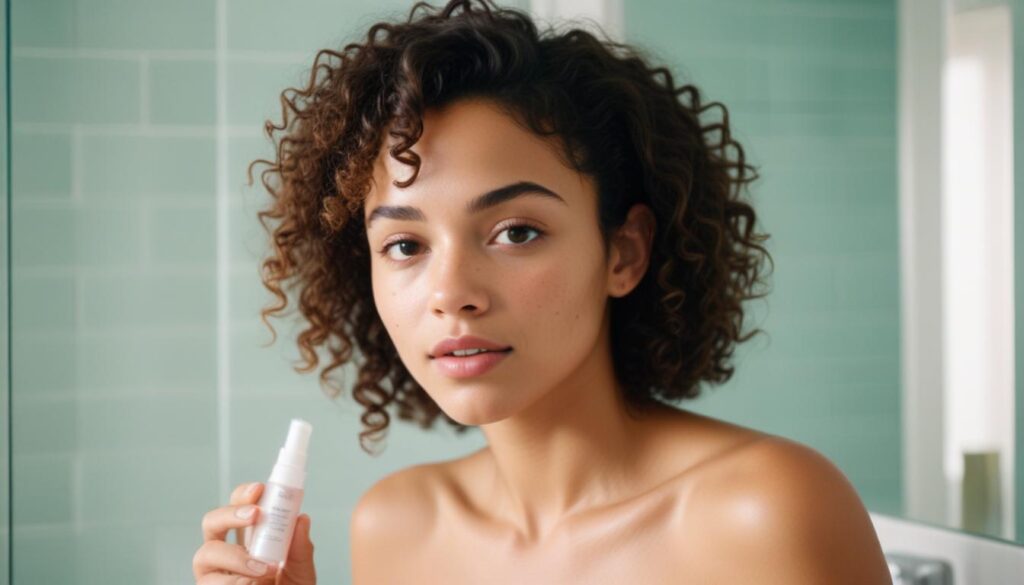
Remember that sponge metaphor we used earlier? Well, that’s exactly how hyaluronic acid works in your skin!
Here’s the breakdown:
- Moisture Magnet: HA acts like a giant sponge, attracting and holding onto water molecules like a champ. This helps keep your skin hydrated and plump.
- Humectant Power: HA is a humectant, meaning it draws moisture from the air and deeper layers of your skin to the surface. This keeps your skin feeling dewy and fresh.
Why is hydration so important?
Think of your skin as a delicate flower. When it’s properly hydrated, it blooms with a healthy glow. But when it’s dry and dehydrated, it becomes wilted and prone to problems like:
- Tightness: Dry skin feels tight and uncomfortable like it’s pulling on itself.
- Flaking: Dryness can lead to flaky patches, making your skin look uneven and irritated.
- Increased Sensitivity: Dry skin is more vulnerable to irritation and inflammation.
So, is hyaluronic acid good for acne? Well, the wait is over! Let’s find out!

Is Hyaluronic Acid Good for Acne?
Hold on to your hats, because we’re finally getting to the big question!
Remember how we talked about dry skin being more prone to problems? Well, acne-prone skin often suffers from dehydration. This can lead to a vicious cycle:
- Dryness triggers oil production: When your skin feels dry, it tries to compensate by producing more oil.
- Excess oil clogs pores: This extra oil can mix with dead skin cells and clog your pores, creating the perfect environment for pimples to form.
So, could hyaluronic acid be the missing piece in your acne-fighting puzzle?
Here’s why HA might be a good friend for acne-prone skin:
- Non-comedogenic: HA is a lightweight, oil-free ingredient that won’t clog your pores. This makes it a safe choice for acne-prone skin.
- Hydration Hero: HA helps keep your skin hydrated, which can prevent it from overproducing oil and potentially reduce the risk of breakouts.
- Anti-inflammatory Power: Some studies suggest that HA may have anti-inflammatory properties, which could help soothe redness and irritation associated with acne.
So, the answer is: Yes, hyaluronic acid can be good for acne! It can help keep your skin hydrated, prevent excess oil production, and potentially reduce inflammation.
However, it’s important to remember that HA isn’t a miracle cure for acne. It’s just one piece of the puzzle in a comprehensive skincare routine.
So, You Want to Use Hyaluronic Acid for Acne?
Let’s get down to the nitty-gritty! Now that you know is hyaluronic acid good for acne, it’s time to learn how to use it effectively:
Product Selection
- Serums: These lightweight formulas are perfect for delivering a concentrated dose of HA. Look for serums with a lower molecular weight for deeper penetration.
- Moisturizers: For extra hydration and a protective barrier, choose a moisturizer containing HA. Opt for oil-free formulas if you have very oily skin.
- Ingredients to Avoid: Steer clear of products with comedogenic ingredients like mineral oil or heavy fragrances, which can clog pores.
Application Tips
- Cleanse First: Always cleanse your skin before applying HA to remove dirt and oil.
- Dampen Your Skin: Apply HA to slightly damp skin to help it absorb better.
- Layer Up: HA works best when layered under a moisturizer to lock in moisture.
- Don’t Overdo It: Start with a pea-sized amount and adjust as needed. Too much HA can feel sticky.
Combining with Other Ingredients
The good news: HA plays well with others! Here are some safe combinations for acne-prone skin:
- Salicylic Acid: This BHA exfoliates and helps unclog pores.
- Benzoyl Peroxide: This ingredient kills acne-causing bacteria.
- Niacinamide: This vitamin helps regulate oil production and reduce inflammation.
Remember: Always patch-test new products on a small area of your skin before using them all over your face.
Hyaluronic Acid Products to Try for Acne-Prone Skin
Now that you’re convinced is hyaluronic acid good for acne, let’s dive into some specific product recommendations!
1.CeraVe Hydrating Hyaluronic Acid Serum
- Features: Fragrance-free, oil-free formula with multiple molecular weights of hyaluronic acid for deeper penetration.
- Why we love it: This gentle serum delivers intense hydration without clogging pores, making it suitable for even sensitive skin.
- Heads Up: May not be as potent as some other serums on the list.
2. La Roche-Posay Hyalu B5 Pure Serum
- Features: Combines hyaluronic acid with vitamin B5 for hydration and calming properties.
- Why we love it: Perfect for acne-prone skin that’s also prone to irritation.
- Heads Up: Can be a bit pricier than other options.
3. The Inkey List Hyaluronic Acid Serum
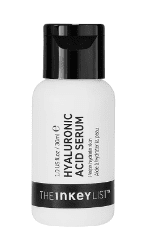
- Features: Lightweight, affordable serum with hyaluronic acid.
- Why we love it: This is a great way to try out hyaluronic acid without breaking the bank.
- Heads Up: May not be as concentrated as some other serums.
4. Paula’s Choice Hyaluronic Acid Booster
- Features: Fragrance-free, oil-free formula with multiple molecular weights of hyaluronic acid.
- Why we love it: Perfect for layering under your moisturizer for an extra hydration boost.
- Heads Up: May not be as effective for very dry skin.
5. Tula Triple-Hydra Complex Day & Night Serum
- Features: Combines hyaluronic acid with ceramides and prebiotics for hydration, strengthening, and soothing.
- Why we love it: This serum targets multiple concerns of acne-prone skin.
- Heads Up: Can be a bit pricier than some other options.
6. Mad Hippie Vitamin C Serum
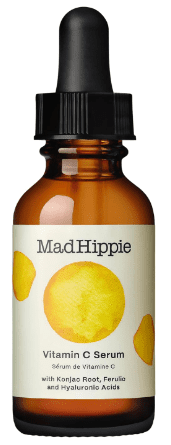
- Features: Combines hyaluronic acid with vitamin C for hydration, brightening, and antioxidant protection.
- Why we love it: This fragrance-free, oil-free serum offers multiple benefits.
- Heads Up: Vitamin C can be irritating for some skin types, so patch test carefully.
7. Isdin Isdinceutics Hyaluronic Concentrate

- Features: High-concentration serum with different molecular weights of hyaluronic acid for multi-layer penetration.
- Why we love it: This powerful serum delivers intense hydration.
- Heads Up: This is a high-end product with a higher price tag.
8. Kiehl’s Ultra Pure 1.5% Hyaluronic Acid Serum
- Features: Fragrance-free, oil-free formula with a high concentration of hyaluronic acid.
- Why we love it: This gentle serum provides deep hydration for dry skin.
- Heads Up: May not be as effective for oily or acne-prone skin.
9. The Ordinary Hyaluronic Acid 2% + B5
- Features: Affordable serum combining hyaluronic acid with vitamin B5 for hydration and soothing benefits.
- Why we love it: This is a great basic option for most skin types.
- Heads Up: May not be as effective for very dry skin.
10. L’Oreal Paris Revitalift 1.5% Hyaluronic Acid Serum
- Features: Lightweight, drugstore serum with hyaluronic acid.
- Why we love it: This is a budget-friendly way to try out hyaluronic acid.
- Heads Up: May not be as concentrated as some other serums.
Potential Side Effects and Precautions

While hyaluronic acid is generally well-tolerated, it’s essential to be aware of potential red flags (side effects) and precautions:
Possible Reactions
- Irritation: In rare cases, some people may experience mild irritation, redness, or stinging after applying HA. This is usually temporary and subsides within a few days.
- Allergic Reactions: Although uncommon, allergic reactions to HA can occur. Symptoms may include severe redness, swelling, itching, or difficulty breathing. If you experience any of these, stop using the product and seek medical attention immediately.
Who Should Avoid It
- People with severe allergies: If you have a history of severe allergic reactions, it’s best to consult a dermatologist before using HA.
- Pregnant or breastfeeding women: While topical hyaluronic acid is generally considered safe and beneficial for most skin types, including during pregnancy, it’s always recommended to consult with a healthcare professional before using any new skincare product, especially during this sensitive time.
- People with open wounds or skin conditions: Avoid applying HA to open wounds or irritated skin, as it may increase the risk of infection. HA can be beneficial in wound healing but should be used in specific forms like specialized wound dressings and under medical supervision.
Additional Precautions
- Patch test: Always do a patch test on a small area of your skin before using any new product containing HA. This helps identify any potential allergic reactions.
- Sun protection: HA can make your skin more sensitive to the sun, so be sure to wear sunscreen daily, even on cloudy days.
- Consult a dermatologist: If you have any concerns about using HA, especially if you have a pre-existing skin condition, consult a dermatologist for personalized advice.
Remember: While HA is generally safe and beneficial for most skin types, it’s important to be aware of potential side effects and use it with caution.
Final Thoughts
So, Is Hyaluronic Acid Good for Acne? The answer is a resounding YES!
hyaluronic acid can be a valuable addition to your acne-fighting arsenal. Its ability to hydrate without clogging pores, soothe inflammation, and potentially reduce oil production makes it a friend to acne-prone skin. Remember, consistency is key, and always patch test before incorporating any new product into your routine. With the right approach, hyaluronic acid can help you achieve a clearer, healthier complexion.
FAQS
Q: Can hyaluronic acid make acne worse?
A: Generally, no! HA is non-comedogenic, meaning it won’t clog your pores and trigger breakouts. However, it’s always possible to have a reaction to any new product. If you experience increased breakouts, redness, or irritation after using HA, stop using it and consult a dermatologist.
Q: Is it safe to use hyaluronic acid every day?
A: Yes, absolutely! HA is gentle and suitable for daily use. In fact, consistent use can help maintain optimal hydration and potentially reduce the risk of future breakouts.
Q: How long does it take to see results from using hyaluronic acid?
A: Everyone’s skin is different, but you might start noticing a plumper, more hydrated complexion within a few weeks of regular use. For acne specifically, it may take a bit longer to see a significant reduction in breakouts, as it’s important to address the underlying causes.
Q: Are there any other ingredients I can use with hyaluronic acid for acne?
A: Definitely! HA plays well with other acne-fighting ingredients like salicylic acid, benzoyl peroxide, and niacinamide. Just remember to patch test any new product before incorporating it into your routine.


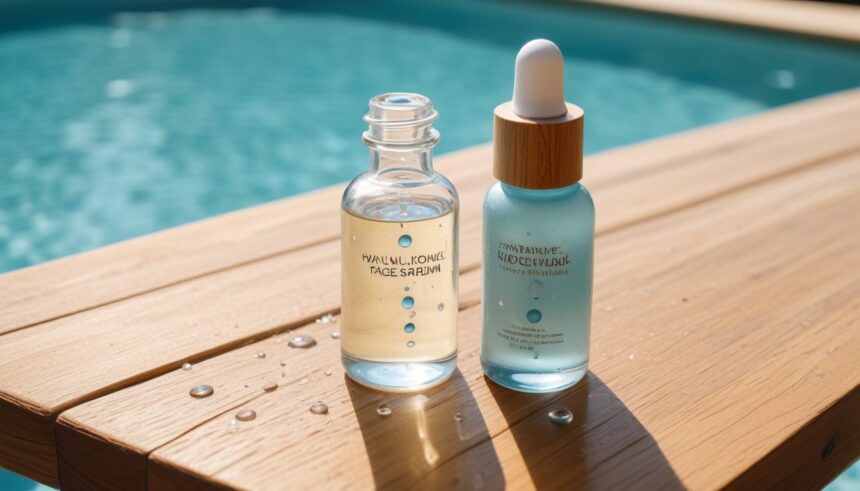
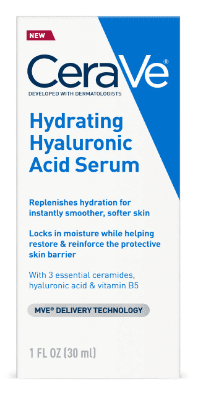

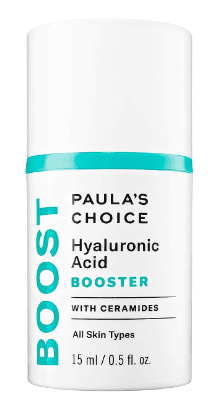

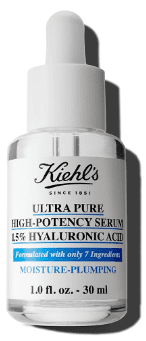
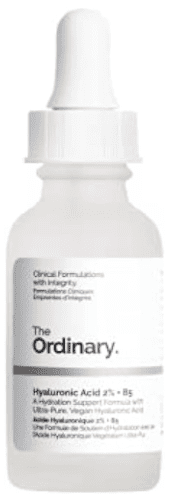
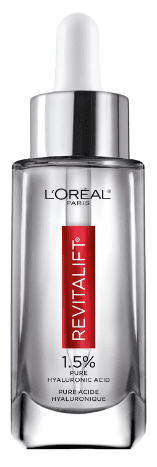

Leave a Reply